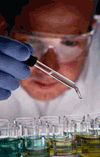 |
What's New at the National Institute on Drug Abuse
09.2007
Press Releases
Common Gene Variant May Offer Protection Against Marijuana Dependence
 New research shows that specific variations in the cannabis receptor gene (CB1) may be associated with the development of one or more symptoms of marijuana dependence in adolescents. This is one of the first studies looking specifically at the link between marijuana dependence and CB1 variations. New research shows that specific variations in the cannabis receptor gene (CB1) may be associated with the development of one or more symptoms of marijuana dependence in adolescents. This is one of the first studies looking specifically at the link between marijuana dependence and CB1 variations.
Read more...
Chronic Abuse of Different Drugs Causes Similar Brain Changes
The results of this study suggest that many drug abusers may experience similar changes in the patterns of global gene expression in their brains, irrespective of their drug of choice. Whether longtime drug abusers favor cocaine, marijuana, or PCP, their autopsied brains showed a number of common gene changes consistent with diminished brain plasticity- i.e., the ability to learn from new experiences and adapt to new situations. Therefore, brain functions may be similarly impaired as the result of chronically abusing different drugs.
Read more...
NIDA Researchers Identify 89 Genes Implicated in Addiction--At Least 21 Are Likely to Affect Brain's Memory Processes
An analysis that compared the DNA of drug abusers with that of non—using controls has identified 89 genes that are likely to contain variants that contribute to addiction vulnerability.
Read more...
NIDA's Dr. Kenner C. Rice Receives Prestigious Smissman Award
Dr. Kenner C. Rice - whose research has led to the development of compounds or medications that have the potential to treat or prevent drug addiction has been selected to receive the 2007 Smissman Award presented by the American Chemical Society (ACS). Dr. Rice, is chief of the Chemical Biology Research Branch of the National Institute on Drug Abuse.
Read more...
Hot News
And the Emmy Goes To...

Drs. Susan Weiss, Nora Volkow, and Gaya Dowling at the Emmys
NIDA and NIAAA have been honored with an Emmy by the Academy of Television Arts and Sciences for their work with HBO on the Addiction Project. The award was received on behalf of NIH by NIDA Director Dr. Nora Volkow at the September 8 Creative Arts Emmy ceremony at the Shrine Auditorium in Los Angeles.
In her acceptance speech, Dr. Volkow said, "I want to thank the Academy for its recognition, and HBO for its vision in developing this project, which has allowed us to reach millions with our message-that addiction is a chronic, relapsing brain disease. It does not care if you are rich or poor, famous or unknown, a man or woman, or even a child. If science-based treatment principles are followed, addiction treatment can work, and people can reclaim their lives."
The documentary can be seen on HBO's web site, http://www.hbo.com/addiction/
NIDA News Release:
http://www.drugabuse.gov/newsroom/07/NR9-16.html
Publications
NIDA's Scientific Journal Has A New Name
 NIDA's journal, Science & Practice Perspectives is officially changing its name to the Journal of Addiction Science & Clinical Practice to reflect its mission of covering the latest in addiction science for both researchers and clinicians, and will be published twice a year. The publication will continue to be included in the National Library of Medicine's MEDLINE database, significantly expanding the reach and influence of its contributors' findings and insights. The peer-reviewed NIDA publication is the most widely distributed journal on addiction science, reaching more than 30,000 readers.
NIDA's journal, Science & Practice Perspectives is officially changing its name to the Journal of Addiction Science & Clinical Practice to reflect its mission of covering the latest in addiction science for both researchers and clinicians, and will be published twice a year. The publication will continue to be included in the National Library of Medicine's MEDLINE database, significantly expanding the reach and influence of its contributors' findings and insights. The peer-reviewed NIDA publication is the most widely distributed journal on addiction science, reaching more than 30,000 readers.
The Journal of Addiction Science & Clinical Practice promotes dialogue between scientists and addiction treatment professionals with the aim of improving drug abuse treatment and research.
Past issues, subscription information, and instructions for author submissions can be found online at www.drugabuse.gov/perspectives.
What's New on our Website?
 This site went online earlier this month. The NIDA Networking Project (NNP) website provides opportunities for information sharing and research collaboration among NIDA's networks across the country. The NNP gives researchers and clinicians access to the networks' locations, people, expertise, and resources to help create synergies, improve efficiency, and accelerate scientific discovery.
This site went online earlier this month. The NIDA Networking Project (NNP) website provides opportunities for information sharing and research collaboration among NIDA's networks across the country. The NNP gives researchers and clinicians access to the networks' locations, people, expertise, and resources to help create synergies, improve efficiency, and accelerate scientific discovery.
|
 |
|

